exchange
-
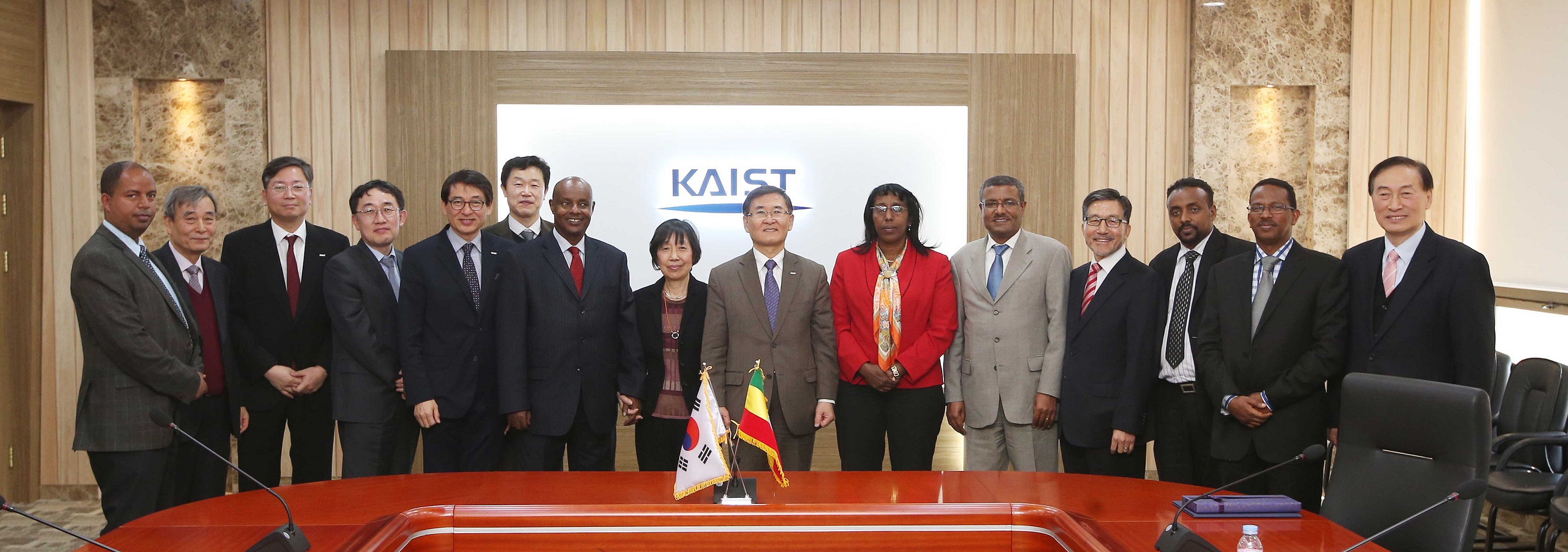 Ethiopian Minister of Education Visits KAIST
An Ethiopian delegation headed by the Minister of Education visited the KAIST campus on February 26, 2015. The delegation consisted of Mr. Demitu Hambisa, Minister of Education, Mr. Dibaba Abdetta, Ethiopian Ambassador to Korea, Dr. Jang-Kyu Lee, President of Adama Science and Technology University (ASTU), and Mr. Nurelegne Tefera, President of Addis Ababa Science and Technology University (AASTU).
Minister Hambisa explained the purpose of his visit, “We would like to learn about what KAIST has achieved over the years for Korea and its people and increase exchanges and cooperation between our universities and KAIST.”
KAIST and the two Ethiopian universities, ASTU and AASTU, signed memoranda of understanding for cooperative programs in science and engineering education.
Established in 1993, ASTU appointed Dr. Jang-Kyu Lee, a former professor from Seoul National University, Korea, to become its president since 2011. President Lee is the first Korean ever to have served the institution.
2015.02.26 View 8355
Ethiopian Minister of Education Visits KAIST
An Ethiopian delegation headed by the Minister of Education visited the KAIST campus on February 26, 2015. The delegation consisted of Mr. Demitu Hambisa, Minister of Education, Mr. Dibaba Abdetta, Ethiopian Ambassador to Korea, Dr. Jang-Kyu Lee, President of Adama Science and Technology University (ASTU), and Mr. Nurelegne Tefera, President of Addis Ababa Science and Technology University (AASTU).
Minister Hambisa explained the purpose of his visit, “We would like to learn about what KAIST has achieved over the years for Korea and its people and increase exchanges and cooperation between our universities and KAIST.”
KAIST and the two Ethiopian universities, ASTU and AASTU, signed memoranda of understanding for cooperative programs in science and engineering education.
Established in 1993, ASTU appointed Dr. Jang-Kyu Lee, a former professor from Seoul National University, Korea, to become its president since 2011. President Lee is the first Korean ever to have served the institution.
2015.02.26 View 8355 -
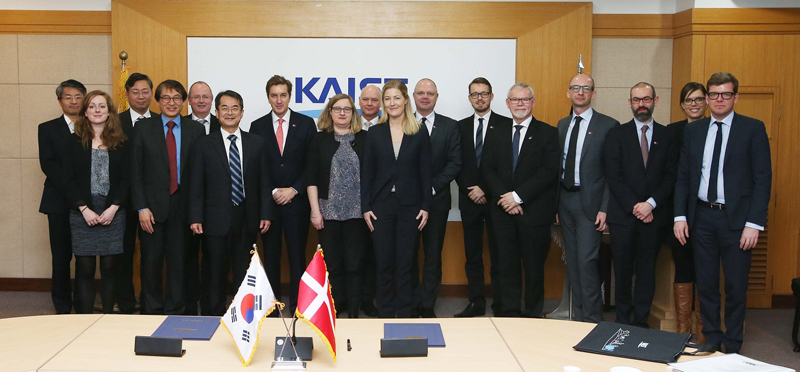 Danish Minister for Higher Education and Science Visits KAIST
Sofie Carsten Nielsen, the Minister for Higher Education and Science of Denmark, accompanied by her delegation, visited KAIST on January 21, 2015 to study outstanding cases of creative economy and to discuss methods of cooperation.
Her delegation included other distinguished members including Thomas Lehmann, the Danish ambassador to Korea, Peter Olesen, Chairman of Innovation Foundation Denmark Governing Board, and Martin Bendsøe, Senior Vice President and Dean of Technical University of Denmark.
After attending the "Electronic Communication Double Degree Agreement" signing ceremony between KAIST’s Department of Electrical Engineering and the Technical University of Denmark, Minister Nielsen visited KAIST’s Institute of Entrepreneurship to observe bilateral industry-university collaborations between KAIST and Denmark and discussed future development plans.
Also, the Grundfos Student Innovation Camp, sponsored by Grundfos, the world's largest pump manufacturer based in Denmark, took place at KAIST from October 26-31, 2014 where Grundfos professionals as well as students from Seoul National University, KAIST, and Technical University of Denmark (DTU) exchanged ideas and opinions on energy efficiency.
KAIST is currently conducting 19 collaborative projects including seven joint researches and seven joint degrees with DTU.
Minister Sofie Carsten Nielsen stands fifth from the left in the front row in the first picture below.
2015.01.27 View 9990
Danish Minister for Higher Education and Science Visits KAIST
Sofie Carsten Nielsen, the Minister for Higher Education and Science of Denmark, accompanied by her delegation, visited KAIST on January 21, 2015 to study outstanding cases of creative economy and to discuss methods of cooperation.
Her delegation included other distinguished members including Thomas Lehmann, the Danish ambassador to Korea, Peter Olesen, Chairman of Innovation Foundation Denmark Governing Board, and Martin Bendsøe, Senior Vice President and Dean of Technical University of Denmark.
After attending the "Electronic Communication Double Degree Agreement" signing ceremony between KAIST’s Department of Electrical Engineering and the Technical University of Denmark, Minister Nielsen visited KAIST’s Institute of Entrepreneurship to observe bilateral industry-university collaborations between KAIST and Denmark and discussed future development plans.
Also, the Grundfos Student Innovation Camp, sponsored by Grundfos, the world's largest pump manufacturer based in Denmark, took place at KAIST from October 26-31, 2014 where Grundfos professionals as well as students from Seoul National University, KAIST, and Technical University of Denmark (DTU) exchanged ideas and opinions on energy efficiency.
KAIST is currently conducting 19 collaborative projects including seven joint researches and seven joint degrees with DTU.
Minister Sofie Carsten Nielsen stands fifth from the left in the front row in the first picture below.
2015.01.27 View 9990 -
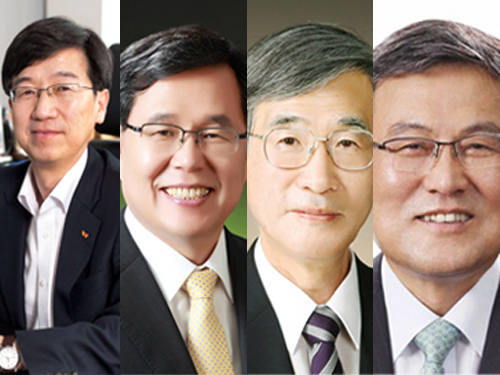 KAIST Announces the Recipients of Distinguished Alumni Awards
The KAIST Alumni Association (KAA) announced four “Proud KAIST Alumni” awards recipients for the year 2014: Sung-Wook Park, the Chief Executive Officer and President of SK Hynix; Seung Ho Shin, the President of Kangwon National University; Kew-Ho Lee, the President of the Korea Research Institute of Chemical Technology; and Mun-Kee Choi, the former Minister of Science, ICT and Future Planning of the Republic of Korea. The award ceremony took place during the 2015 KAA’s New Year's ceremony on January 17, 2015 at the Palace Hotel in Seoul.
Sung-Wook Park (M.S. ’82 and Ph.D. ’88, Department of Materials Science and Engineering), the Chief Executive Officer and President of SK Hynix, has worked as an expert in the field of memory semi-conductors for the past 30 years. He developed innovative technology and improved production efficiency, enabling the Korean semi-conductor industry to become a global leader.
Seung Ho Shin (M.S. ’79 and Ph.D. ’87, Department of Physics), the President of Kangwon National University (KNU), worked in the field of optical information processing, producing excellent research achievements and teaching the next generation of scientists. As the president of KNU, he has set an exemplary leadership in higher education.
Kew-Ho Lee (M.S. ’75, Department of Chemistry), the President of the Korea Research Institute of Chemical Technology, pioneered the field of separation film production which contributed greatly to Korean technological developments. He led several domestic and international societies to facilitate dynamic exchanges between industry and academia and with the international community.
Mun-Kee Choi (M.S. ’76, Department of Industrial and Systems Engineering), the former Minister of Science, ICT and Future Planning, the Republic of Korea, is a great contributor to the information and communications technology in Korea, working as a leader in the field of broadband integrated service digital network. He is also an educator for gifted students in science and technology, and a manager of the Electronics and Telecommunications Research Institute.
The Alumni Association established the “Proud KAIST Alumni Awards” in 1992 to recognize its alumni’s outstanding contributions to Korea and KAIST.
Pictured from left to right, Sung-Wook Park (the Chief Executive Officer and President of SK Hynix), Seung Ho Shin (the President of Kangwon National University), Kew-Ho Lee (the President of the Korea Research Institute of Chemical Technology), and Mun-Kee Choi (the former Minister of Science, ICT and Future Planning)
2015.01.19 View 15561
KAIST Announces the Recipients of Distinguished Alumni Awards
The KAIST Alumni Association (KAA) announced four “Proud KAIST Alumni” awards recipients for the year 2014: Sung-Wook Park, the Chief Executive Officer and President of SK Hynix; Seung Ho Shin, the President of Kangwon National University; Kew-Ho Lee, the President of the Korea Research Institute of Chemical Technology; and Mun-Kee Choi, the former Minister of Science, ICT and Future Planning of the Republic of Korea. The award ceremony took place during the 2015 KAA’s New Year's ceremony on January 17, 2015 at the Palace Hotel in Seoul.
Sung-Wook Park (M.S. ’82 and Ph.D. ’88, Department of Materials Science and Engineering), the Chief Executive Officer and President of SK Hynix, has worked as an expert in the field of memory semi-conductors for the past 30 years. He developed innovative technology and improved production efficiency, enabling the Korean semi-conductor industry to become a global leader.
Seung Ho Shin (M.S. ’79 and Ph.D. ’87, Department of Physics), the President of Kangwon National University (KNU), worked in the field of optical information processing, producing excellent research achievements and teaching the next generation of scientists. As the president of KNU, he has set an exemplary leadership in higher education.
Kew-Ho Lee (M.S. ’75, Department of Chemistry), the President of the Korea Research Institute of Chemical Technology, pioneered the field of separation film production which contributed greatly to Korean technological developments. He led several domestic and international societies to facilitate dynamic exchanges between industry and academia and with the international community.
Mun-Kee Choi (M.S. ’76, Department of Industrial and Systems Engineering), the former Minister of Science, ICT and Future Planning, the Republic of Korea, is a great contributor to the information and communications technology in Korea, working as a leader in the field of broadband integrated service digital network. He is also an educator for gifted students in science and technology, and a manager of the Electronics and Telecommunications Research Institute.
The Alumni Association established the “Proud KAIST Alumni Awards” in 1992 to recognize its alumni’s outstanding contributions to Korea and KAIST.
Pictured from left to right, Sung-Wook Park (the Chief Executive Officer and President of SK Hynix), Seung Ho Shin (the President of Kangwon National University), Kew-Ho Lee (the President of the Korea Research Institute of Chemical Technology), and Mun-Kee Choi (the former Minister of Science, ICT and Future Planning)
2015.01.19 View 15561 -
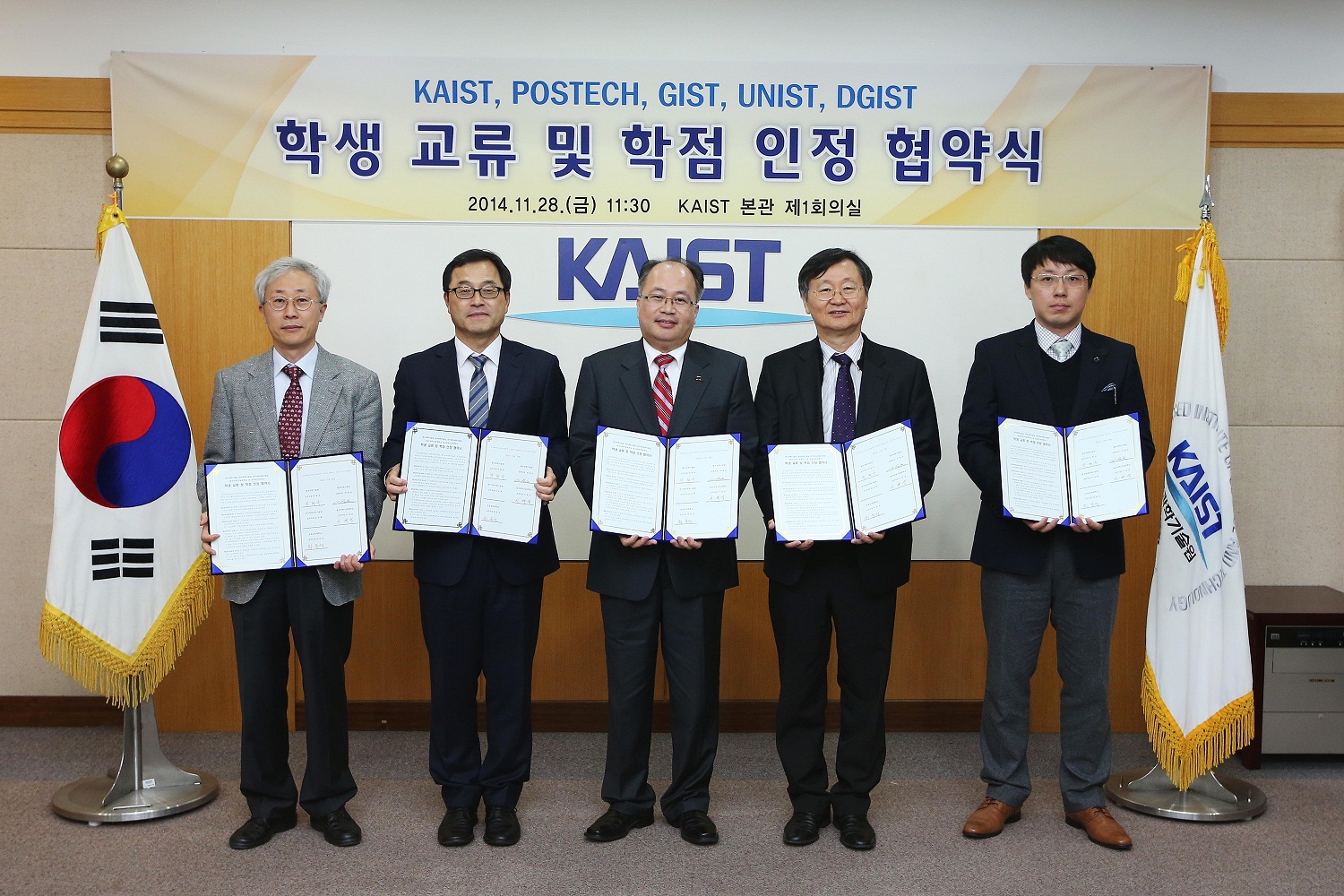 KAIST Partners with Science-focused Universities in Korea for Student Exchange Programs
KAIST and four science-focused universities in Korea (Pohang University of Science and Technology, Gwangju Institute of Science and Technology, Daegu Gyeongbuk Institute of Science and Technology, and Ulsan National Institute of Science and Technology) agreed to exchange programs during academic semesters including summer and winter terms by signing a memorandum of understanding (MOU) on November 28, 2014. The signing ceremony took place at the KAIST campus with the participation of academic affairs deans from all five universities.
Based on the agreement, KAIST students can take up to 12 credits of coursework at any of the said universities and have unimpeded access to the university facilities during their coursework.
Dean Hyun-Wook Park of Academic Affairs at KASIT said, “Through exchange programs, students can capitalize on each university’s advantages, and this eventually will lead to greater advancement in science and technology in the nation.”
2014.12.08 View 8468
KAIST Partners with Science-focused Universities in Korea for Student Exchange Programs
KAIST and four science-focused universities in Korea (Pohang University of Science and Technology, Gwangju Institute of Science and Technology, Daegu Gyeongbuk Institute of Science and Technology, and Ulsan National Institute of Science and Technology) agreed to exchange programs during academic semesters including summer and winter terms by signing a memorandum of understanding (MOU) on November 28, 2014. The signing ceremony took place at the KAIST campus with the participation of academic affairs deans from all five universities.
Based on the agreement, KAIST students can take up to 12 credits of coursework at any of the said universities and have unimpeded access to the university facilities during their coursework.
Dean Hyun-Wook Park of Academic Affairs at KASIT said, “Through exchange programs, students can capitalize on each university’s advantages, and this eventually will lead to greater advancement in science and technology in the nation.”
2014.12.08 View 8468 -
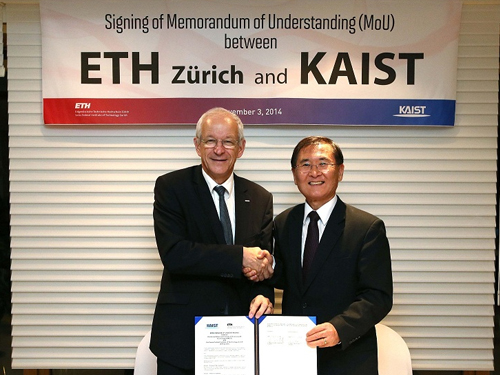 KAIST and ETH Zürich Sign a MOU on Cooperation in Education and Research
KAIST and ETH Zürich, a leading engineering, science, and technology university in Switzerland, signed a memorandum of understanding (MOU) to cooperate in engineering education and research on November 3, 2014 at the KAIST campus.
The two universities have agreed to implement student and academic exchange programs, collaborate on research in the advanced fields of engineering, and host joint conferences and seminars.
President Steve Kang of KAIST (on the right in the picture below) and President Ralph Eichler of ETH Zürich (on the left) attended the signing ceremony.
President Kang commented that KAIST and ETH Zürich would mutually benefit from the cooperation, sharing their knowledge and resources to further develop their faculty and student's work in the field.
2014.11.11 View 6941
KAIST and ETH Zürich Sign a MOU on Cooperation in Education and Research
KAIST and ETH Zürich, a leading engineering, science, and technology university in Switzerland, signed a memorandum of understanding (MOU) to cooperate in engineering education and research on November 3, 2014 at the KAIST campus.
The two universities have agreed to implement student and academic exchange programs, collaborate on research in the advanced fields of engineering, and host joint conferences and seminars.
President Steve Kang of KAIST (on the right in the picture below) and President Ralph Eichler of ETH Zürich (on the left) attended the signing ceremony.
President Kang commented that KAIST and ETH Zürich would mutually benefit from the cooperation, sharing their knowledge and resources to further develop their faculty and student's work in the field.
2014.11.11 View 6941 -
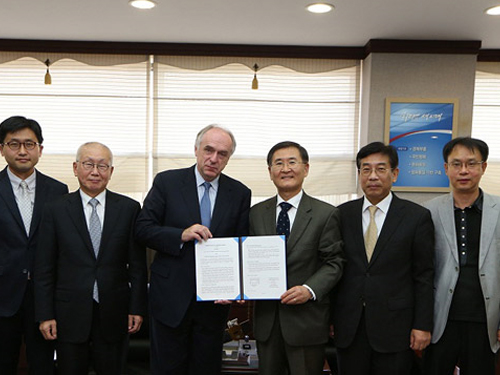 KAIST and the International Institute for Applied Systems Analysis Agree to Cooperate
KAIST signed a cooperation agreement with the International Institute for Applied Systems Analysis (IIASA) on October 29, 2014 at the president’s office.
Established in 1972 and based in Austria as a non-governmental research organization, IIASA is an international scientific institute that conducts policy-oriented research into global problems such as climate change, energy security, or population aging. IIASA examines such issues and devises strategies for cooperative action unconstrained by political and national self-interest.
Dr. Pavel Kabat, the Director General and CEO of IIASA, headed a delegation that visited KAIST to attend the signing ceremony of the agreement. He said, “KAIST has been known as a leading research university, and its strength in the development of green technology and environmental policy will benefit our institution. In particular, we expect to see vibrant exchanges of knowledge and researchers with the Graduate School of Green Growth (GSGG) and the Graduate School of EEWS (energy, environment, water, and sustainability) at KAIST.”
The two organizations will implement joint research projects in the diffusion analysis of green technology, the development and improvement of evaluation models to integrate economy, energy, and environment, the development of an analysis system for water resources, and the establishment of academic workshops and conferences.
The Dean of GSGG, Professor Jae-Kyu Lee said, “IIASA is a well-respected international organization with accumulated knowledge about analysis and prediction techniques. With this agreement, we hope that KAIST will intensify its research capacity in environmental science and lead education and research in green growth and environmental technology.”
The picture below shows Dr. Pavel Kabat, the Director General and CEO of IIASA, on the left and President Steve Kang of KAIST on the right holding the signed agreement with professors from GSGG and EEWS Graduate School including Professor Jae-Kyu Lee, to the right of President Kang.
2014.11.05 View 11043
KAIST and the International Institute for Applied Systems Analysis Agree to Cooperate
KAIST signed a cooperation agreement with the International Institute for Applied Systems Analysis (IIASA) on October 29, 2014 at the president’s office.
Established in 1972 and based in Austria as a non-governmental research organization, IIASA is an international scientific institute that conducts policy-oriented research into global problems such as climate change, energy security, or population aging. IIASA examines such issues and devises strategies for cooperative action unconstrained by political and national self-interest.
Dr. Pavel Kabat, the Director General and CEO of IIASA, headed a delegation that visited KAIST to attend the signing ceremony of the agreement. He said, “KAIST has been known as a leading research university, and its strength in the development of green technology and environmental policy will benefit our institution. In particular, we expect to see vibrant exchanges of knowledge and researchers with the Graduate School of Green Growth (GSGG) and the Graduate School of EEWS (energy, environment, water, and sustainability) at KAIST.”
The two organizations will implement joint research projects in the diffusion analysis of green technology, the development and improvement of evaluation models to integrate economy, energy, and environment, the development of an analysis system for water resources, and the establishment of academic workshops and conferences.
The Dean of GSGG, Professor Jae-Kyu Lee said, “IIASA is a well-respected international organization with accumulated knowledge about analysis and prediction techniques. With this agreement, we hope that KAIST will intensify its research capacity in environmental science and lead education and research in green growth and environmental technology.”
The picture below shows Dr. Pavel Kabat, the Director General and CEO of IIASA, on the left and President Steve Kang of KAIST on the right holding the signed agreement with professors from GSGG and EEWS Graduate School including Professor Jae-Kyu Lee, to the right of President Kang.
2014.11.05 View 11043 -
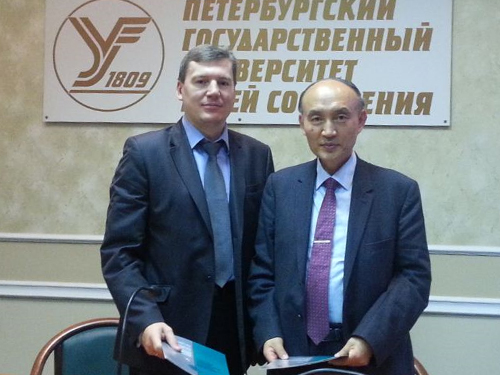 KAIST and Petersburg State Transport University Sign a MOU on Green Transportation
The Petersburg State Transport University (PSTU) in Russia is a higher education institution specializing in railway transport.
KAIST and PSTU signed a memorandum of understating (MOU) on October 28, 2014 at the KAIST campus and agreed to collaborate in the research of and hold academic exchanges for green transportation.
Based on the agreement, the two institutions will collaborate in the development of a high capacity railway that is powered through wireless power transfer technology and will exchange personnel and academic knowledge to advance the field of green transportation.
The Graduate School for Green Transportation (GSGT) at KAIST organized a seminar which took place after the MOU signing ceremony. Professor Dong-Ho Cho, the Dean of GSGT, presented a keynote speech at the seminar on “Korea’s Green Transportation Policy and Its Technology Development Status” to the audience including the PSTU delegation.
Established in 1809, PSTU is one of the oldest and most prestigious engineering universities in Russia, serving as an important scientific and research center in the area of engineering, construction, and railway operation.
2014.11.04 View 9686
KAIST and Petersburg State Transport University Sign a MOU on Green Transportation
The Petersburg State Transport University (PSTU) in Russia is a higher education institution specializing in railway transport.
KAIST and PSTU signed a memorandum of understating (MOU) on October 28, 2014 at the KAIST campus and agreed to collaborate in the research of and hold academic exchanges for green transportation.
Based on the agreement, the two institutions will collaborate in the development of a high capacity railway that is powered through wireless power transfer technology and will exchange personnel and academic knowledge to advance the field of green transportation.
The Graduate School for Green Transportation (GSGT) at KAIST organized a seminar which took place after the MOU signing ceremony. Professor Dong-Ho Cho, the Dean of GSGT, presented a keynote speech at the seminar on “Korea’s Green Transportation Policy and Its Technology Development Status” to the audience including the PSTU delegation.
Established in 1809, PSTU is one of the oldest and most prestigious engineering universities in Russia, serving as an important scientific and research center in the area of engineering, construction, and railway operation.
2014.11.04 View 9686 -
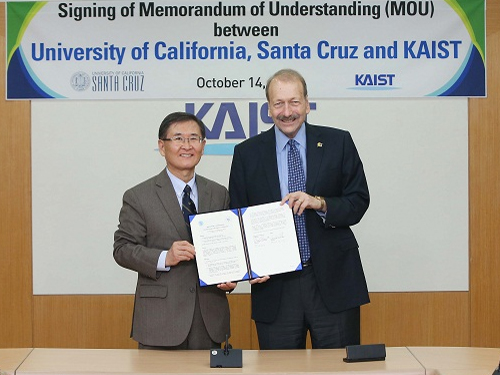 KAIST and University of California, Santa Cruz, Agree to Cooperate
KAIST and the University of California in Santa Cruz signed a memorandum of understanding (MOU) at the KAIST campus on October 14, 2014.
The two institutions agreed to cooperate in the following four areas:
- Research collaboration in genomics and biology
- Academic exchanges in engineering and information communication technology
- Student and faculty exchange programs
- Joint academic workshops and seminars
Following the MOU signing ceremony, Dr. George Blumenthal, the Chancellor of UC Santa Cruz, held a special seminar for KAIST students and faculty, during which he shared some of the success stories made through UC Santa Cruz’s close cooperation with companies in Silicon Valley.
President Steve Kang of KAIST praised the MOU saying, “KAIST and UC Santa Cruz have top-notch research professionals, and the MOU will reinforce their research capability. We hope that the two universities will carry out many research projects that bring significant impact on the world.”
UC Santa Cruz was established in 1965 as a public research university committed to undergraduate education. The university has a total student population of 16,000 (15,375 undergraduates and 1,378 graduates). Offering 60 undergraduate majors, UC Santa Cruz's faculty includes six recipients of Pulitzer Prizes and five MacArthur Genius Awards. The university was ranked the 2nd in the world for research influence in 2012-2013 Times Higher Education rankings.
2014.10.15 View 8807
KAIST and University of California, Santa Cruz, Agree to Cooperate
KAIST and the University of California in Santa Cruz signed a memorandum of understanding (MOU) at the KAIST campus on October 14, 2014.
The two institutions agreed to cooperate in the following four areas:
- Research collaboration in genomics and biology
- Academic exchanges in engineering and information communication technology
- Student and faculty exchange programs
- Joint academic workshops and seminars
Following the MOU signing ceremony, Dr. George Blumenthal, the Chancellor of UC Santa Cruz, held a special seminar for KAIST students and faculty, during which he shared some of the success stories made through UC Santa Cruz’s close cooperation with companies in Silicon Valley.
President Steve Kang of KAIST praised the MOU saying, “KAIST and UC Santa Cruz have top-notch research professionals, and the MOU will reinforce their research capability. We hope that the two universities will carry out many research projects that bring significant impact on the world.”
UC Santa Cruz was established in 1965 as a public research university committed to undergraduate education. The university has a total student population of 16,000 (15,375 undergraduates and 1,378 graduates). Offering 60 undergraduate majors, UC Santa Cruz's faculty includes six recipients of Pulitzer Prizes and five MacArthur Genius Awards. The university was ranked the 2nd in the world for research influence in 2012-2013 Times Higher Education rankings.
2014.10.15 View 8807 -
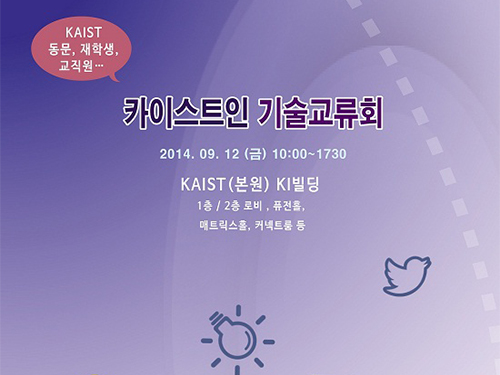 The Alumni Association of KAIST hosts the first KAIST Technology Exchange Meeting
The Alumni Association of KAIST hosted the first KAIST Technology Exchange Meeting on September 12th at the KAIST Institute on campus.
About 14 alumni companies, MDS Technology, Biospace, and Satrec Initiative, two private equity funds including KAIST Entrepreneurship Foundation, and KAIST Technology Commercialization Center participated in this meeting.
This meeting was organized by the Alumni Association of KAIST in order to strengthen cooperation between alumni companies and KAIST members by increasing technology exchange and fostering cooperative culture.
The meeting comprised of two sessions: product exhibition and technology-exchange session.
During the exhibition, participating companies prepared the following: product showcase, intellectual property exchange, project consulting, and employment information.
Companies involved in technology-exchange session not only showcased their brand new technology but also shared their innovative ideas and entrepreneur vision, and discussed joint R&D.
The president of the Alumni Association of KAIST, Man Kee Baek who was in charge of this meeting said, “I hope this meeting stimulates more technology exchange between alumni companies and school members.”
He added that “our alumni association will continue to organize many projects for better KAIST.”
Detailed information about the event can be found on the official webpage of the Alumni Association of KAIST (http://www.ilovekaist.net), and this event was open to the public.
A company specializing in medical devices, Biospace, plans to donate a body composition analyzer and an automatic blood pressure meter worth 14,000,000 won to KAIST.
2014.09.15 View 7141
The Alumni Association of KAIST hosts the first KAIST Technology Exchange Meeting
The Alumni Association of KAIST hosted the first KAIST Technology Exchange Meeting on September 12th at the KAIST Institute on campus.
About 14 alumni companies, MDS Technology, Biospace, and Satrec Initiative, two private equity funds including KAIST Entrepreneurship Foundation, and KAIST Technology Commercialization Center participated in this meeting.
This meeting was organized by the Alumni Association of KAIST in order to strengthen cooperation between alumni companies and KAIST members by increasing technology exchange and fostering cooperative culture.
The meeting comprised of two sessions: product exhibition and technology-exchange session.
During the exhibition, participating companies prepared the following: product showcase, intellectual property exchange, project consulting, and employment information.
Companies involved in technology-exchange session not only showcased their brand new technology but also shared their innovative ideas and entrepreneur vision, and discussed joint R&D.
The president of the Alumni Association of KAIST, Man Kee Baek who was in charge of this meeting said, “I hope this meeting stimulates more technology exchange between alumni companies and school members.”
He added that “our alumni association will continue to organize many projects for better KAIST.”
Detailed information about the event can be found on the official webpage of the Alumni Association of KAIST (http://www.ilovekaist.net), and this event was open to the public.
A company specializing in medical devices, Biospace, plans to donate a body composition analyzer and an automatic blood pressure meter worth 14,000,000 won to KAIST.
2014.09.15 View 7141 -
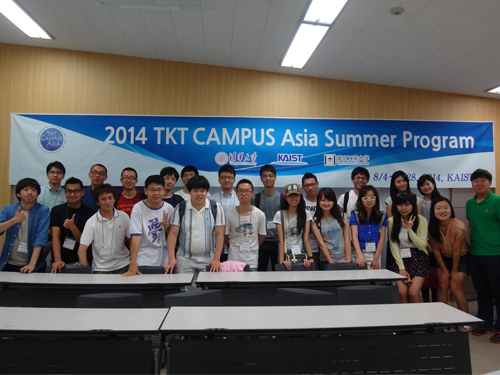 The 2014 CAMPUS Asia Summer Program
The CAMPUS Asia (Collective Action for Mobility Program of University Students in Asia) is an academic exchange program originally proposed at the third presidential meeting of three nations, Korea, China, and Japan, which was held in May 2010 on Jeju Island.
Under the proposal, three science and technology universities, Tsinghua University (China), KAIST (Korea), and Tokyo Institute of Technology (Japan), created a program in 2012 for academic and research collaboration, TKT CAMPUS Asia. Since then, each university has been hosting an exchange program in rotation.
The 2014 summer program of TKT CAMPUS Asia was held from August 4th through 28th at KAIST. A total of 13 professors from the departments of chemical engineering, mechanical engineering, and life science, as well as 25 students participated. Under the summer program, three courses in biotechnology, mechanical engineering, and Korean language were offered. The universities gave credits for all courses.
As part of TKT CAMPUS Asia, KAIST has also operated a semester study abroad and foreign exchange program and will begin a joint degree program by 2015.
Professor Jung Kim of the Department of Mechanical Engineering at KAIST said,
“Just as the Erasmus Program (European Community Action Scheme for the Mobility of University Students) contributed to the foundation of the European Union, we hope that the CAMPUS Asia will serve a similar goal for a greater Asia.”
2014.09.03 View 6998
The 2014 CAMPUS Asia Summer Program
The CAMPUS Asia (Collective Action for Mobility Program of University Students in Asia) is an academic exchange program originally proposed at the third presidential meeting of three nations, Korea, China, and Japan, which was held in May 2010 on Jeju Island.
Under the proposal, three science and technology universities, Tsinghua University (China), KAIST (Korea), and Tokyo Institute of Technology (Japan), created a program in 2012 for academic and research collaboration, TKT CAMPUS Asia. Since then, each university has been hosting an exchange program in rotation.
The 2014 summer program of TKT CAMPUS Asia was held from August 4th through 28th at KAIST. A total of 13 professors from the departments of chemical engineering, mechanical engineering, and life science, as well as 25 students participated. Under the summer program, three courses in biotechnology, mechanical engineering, and Korean language were offered. The universities gave credits for all courses.
As part of TKT CAMPUS Asia, KAIST has also operated a semester study abroad and foreign exchange program and will begin a joint degree program by 2015.
Professor Jung Kim of the Department of Mechanical Engineering at KAIST said,
“Just as the Erasmus Program (European Community Action Scheme for the Mobility of University Students) contributed to the foundation of the European Union, we hope that the CAMPUS Asia will serve a similar goal for a greater Asia.”
2014.09.03 View 6998 -
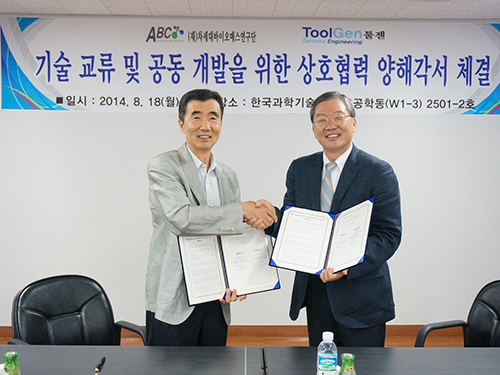 KAIST's Advanced Biomass R&D Center and ToolGen will cooperate
The Advanced Biomass R&D Center (ABC) at KAIST and ToolGen, Inc., a Korean biotechnology company focused on the development of engineered nucleases that can be used as essential tools for editing genetic information in microbial, plant, animal, and human cells, signed a memorandum of understanding (MOU) on August 18, 2014 for technology exchange and research collaboration.
ABC is headed by Executive Director Ji-Won Yang, a professor emeritus at the Department of Chemical and Biomolecular Engineering, and Chief Executive Officer Jong-Moon Kim for ToolGen.
The newly signed MOU encourages collaborations in the following areas:
- Development of genome editing technology for microalgae modification
- Development of microalgae that increases biofuel production through the
application of genome editing technology
- Creation of education and training programs for researchers
- Collaboration in other areas
In addition, the two organizations decided to cooperate in the improvement of biofuel yields using ToolGen’s genome editing technology, the commercialization of research outcomes, and the development of eco-friendly biofuels from biomass.
Executive Director Yang commented that “improving biofuel production is crucial to accelerate the commercialization of biofuels, and collaborating with ToolGen will help us realize that goal.” He further said that “The importance of this MOU lies in the fact that the global chemical industry including Korea has been making substantial efforts to shift its attention from a fossil fuel-based development to a more bio-based technology.”
Jin-Soo Kim, the director of the Genome Editing Research Center at the Institute of Basic Sciences in Korea and the cofounder of ToolGen, added that “ToolGen has successfully commercialized its third generation genetic scissors, which shows a lot of promise for commercialization. Our collaboration with KAIST will serve as the driving force to create new industries and accordingly, new jobs.”
2014.09.03 View 11265
KAIST's Advanced Biomass R&D Center and ToolGen will cooperate
The Advanced Biomass R&D Center (ABC) at KAIST and ToolGen, Inc., a Korean biotechnology company focused on the development of engineered nucleases that can be used as essential tools for editing genetic information in microbial, plant, animal, and human cells, signed a memorandum of understanding (MOU) on August 18, 2014 for technology exchange and research collaboration.
ABC is headed by Executive Director Ji-Won Yang, a professor emeritus at the Department of Chemical and Biomolecular Engineering, and Chief Executive Officer Jong-Moon Kim for ToolGen.
The newly signed MOU encourages collaborations in the following areas:
- Development of genome editing technology for microalgae modification
- Development of microalgae that increases biofuel production through the
application of genome editing technology
- Creation of education and training programs for researchers
- Collaboration in other areas
In addition, the two organizations decided to cooperate in the improvement of biofuel yields using ToolGen’s genome editing technology, the commercialization of research outcomes, and the development of eco-friendly biofuels from biomass.
Executive Director Yang commented that “improving biofuel production is crucial to accelerate the commercialization of biofuels, and collaborating with ToolGen will help us realize that goal.” He further said that “The importance of this MOU lies in the fact that the global chemical industry including Korea has been making substantial efforts to shift its attention from a fossil fuel-based development to a more bio-based technology.”
Jin-Soo Kim, the director of the Genome Editing Research Center at the Institute of Basic Sciences in Korea and the cofounder of ToolGen, added that “ToolGen has successfully commercialized its third generation genetic scissors, which shows a lot of promise for commercialization. Our collaboration with KAIST will serve as the driving force to create new industries and accordingly, new jobs.”
2014.09.03 View 11265 -
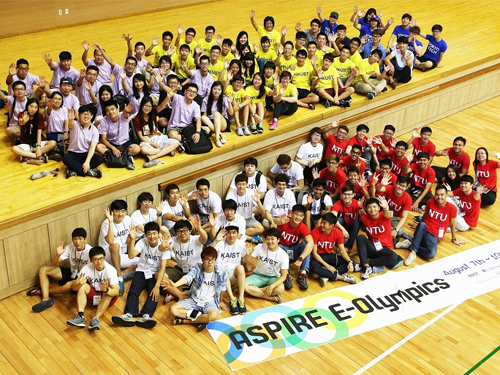 ASPIRE League 2014: E-Olympics among Five Asian Universities
About 150 undergraduate students from five leading science and technology (S&T) universities in Asia met at the KAIST campus to attend the E-Olympics on August 7-9, 2014.
The E-Olympics began as a student exchange conference held under the Asian Science and Technology Pioneering Institutes of Research and Education (ASPIRE) League, which offers a variety of events, such as workshops, sports matches, lab visits, special lectures, and art performances, to promote academic and research collaborations and cultural sharing between the students of the league member universities.
Founded in 2009, the ASPIRE League is a university consortium consisted of five top S&T universities in Asia: KAIST in Korea, the Hong Kong University of Science and Technology (HKUST) and Tsinghua University in China, Nanyang Technological University (NTU) in Singapore, and Tokyo Institute of Technology (Tokyo Tech) in Japan. The ASPIRE League aims to provide a knowledge and technology hub for innovation in Asia through the advancement of science and technology and the development of human resources.
Since its start, the ASPIRE League has been holding an annual conference with programs for research collaboration, student exchange, educational cooperation, and satellite laboratories among professors, senior managers, and students of the member universities. This year, however, the consortium decided to dedicate the conference to students by holding the E-Olympics.
Each university sent 30 students to KAIST for the participation of the E-Olympics. For three days, participating students engaged in discussions and presentations at academic workshops; held athletic games including a relay race, basketball, and a rowing race; and toured a few KAIST laboratories, among them: the E-mobility Research Center, the Bio-imaging and Cell Signaling Research Center, the Mechatronics Systems and Control Center, and the Center of Field Robotics for Innovation, Exploration and Defense.
The students also attended a music concert performed by a KAIST student club and a lecture entitled “Entrepreneurship through Global Networking” that emphasized the importance of personnel networking in transferring technological innovation into business opportunities.
Chang-Dong Yoo, the Dean of the International Office at KAIST, said, “The E-Olympics will offer students from top science and technology universities in Asia opportunities to interact with each other on a more personal level. I hope that through many of the E-Olympics programs, the students will learn about each other’s culture and academic strength and develop a sense of community to create a “New Asia” by working together.”
2014.08.11 View 13561
ASPIRE League 2014: E-Olympics among Five Asian Universities
About 150 undergraduate students from five leading science and technology (S&T) universities in Asia met at the KAIST campus to attend the E-Olympics on August 7-9, 2014.
The E-Olympics began as a student exchange conference held under the Asian Science and Technology Pioneering Institutes of Research and Education (ASPIRE) League, which offers a variety of events, such as workshops, sports matches, lab visits, special lectures, and art performances, to promote academic and research collaborations and cultural sharing between the students of the league member universities.
Founded in 2009, the ASPIRE League is a university consortium consisted of five top S&T universities in Asia: KAIST in Korea, the Hong Kong University of Science and Technology (HKUST) and Tsinghua University in China, Nanyang Technological University (NTU) in Singapore, and Tokyo Institute of Technology (Tokyo Tech) in Japan. The ASPIRE League aims to provide a knowledge and technology hub for innovation in Asia through the advancement of science and technology and the development of human resources.
Since its start, the ASPIRE League has been holding an annual conference with programs for research collaboration, student exchange, educational cooperation, and satellite laboratories among professors, senior managers, and students of the member universities. This year, however, the consortium decided to dedicate the conference to students by holding the E-Olympics.
Each university sent 30 students to KAIST for the participation of the E-Olympics. For three days, participating students engaged in discussions and presentations at academic workshops; held athletic games including a relay race, basketball, and a rowing race; and toured a few KAIST laboratories, among them: the E-mobility Research Center, the Bio-imaging and Cell Signaling Research Center, the Mechatronics Systems and Control Center, and the Center of Field Robotics for Innovation, Exploration and Defense.
The students also attended a music concert performed by a KAIST student club and a lecture entitled “Entrepreneurship through Global Networking” that emphasized the importance of personnel networking in transferring technological innovation into business opportunities.
Chang-Dong Yoo, the Dean of the International Office at KAIST, said, “The E-Olympics will offer students from top science and technology universities in Asia opportunities to interact with each other on a more personal level. I hope that through many of the E-Olympics programs, the students will learn about each other’s culture and academic strength and develop a sense of community to create a “New Asia” by working together.”
2014.08.11 View 13561